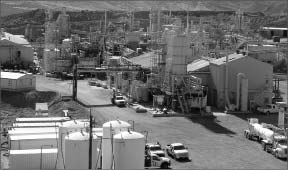In August Molycorp‘s (MCP-N) proposed partnership with Hitachi Metals to create a joint venture that would manufacture neodymium-iron-boron (NdFeB) alloy and permanent rare earth magnets fell through when the two companies failed to reach an agreement on valuation. Some industry watchers questioned whether the company could negotiate a joint venture at all.
That risk was removed on Nov. 28 when the U.S.-based rare earth producer announced a joint venture with Daido Steel and Mitsubishi to manufacture and sell the NdFeB permanent rare-earth magnets in a three-way partnership, with Molycorp’s capital contribution ratio set at 30%, Daido’s at 35.5% and Mitsubishi’s at 34.5%. The joint venture will be financed by the three companies and a subsidiary of the Japanese government’s Ministry of Economy, Trade and Industry.
The partners will build an initial 500-tonne-per-year magnet manufacturing facility in Nakatsugawa City, Japan, and operations are expected to start in January 2013. Molycorp said the companies plan to begin work on the new facility in December and eventually expand operations to the U.S. and elsewhere.
The sintered NdFeB permanent rare earth magnets will be manufactured with technology licensed from Intermetallics, a partnership between Mitsubishi, Daido Steel and Masato Sagawa, one of the inventors of the NdFeB magnet, Molycorp says.
“The technology to be used by the joint venture is a new and novel approach that does not depend on the use of patents held by other magnet companies,” Molycorp stated in a press release. “The technology allows for the manufacture of permanent rare earth magnets that deliver greater performance with less reliance on dysprosium, a relatively scarce rare earth. The process also results in higher production yields.”
Mark Smith, Molycorp’s chief executive officer, noted that the joint venture “can break ground almost immediately, and will be able to produce some of the world’s most powerful rare earth magnets in as little as fourteen months.”
“This is a positive development for the company, as it continues to demonstrate its ability to execute on its mine-to-magnets strategy,” Brian Chin, an analyst at Gabelli and Company in New York, wrote in an email to The Northern Miner. “The Japanese subsidiary will be putting up approximately [U.S.] twenty million, and total capital expenditure for the project is expected to be eighty million to ninety million.”
News of the joint-venture agreement sent shares of Molycorp up 13.6%, or US$3.67, to close at US$30.65 per share on 6.67 million shares traded. At presstime Molycorp shares traded at US$30.99.
Jon Hykaway of Byron Capital Markets has changed his hold rating on the stock to a buy, and raised his target price from US$37.50 per share to US$40 per share.
“One of the biggest risks to our previous Molycorp target price was the uncertainty regarding a magnet and manufacturing joint-venture partner,” he said in a note to clients. “Not only were we uncertain as to terms, there was always an outside chance that Molycorp management would be unable to negotiate a joint venture at all. That risk has now been removed.”
NdFeB magnets are made with the rare earths neodymium, praseodymium, dysprosium and terbium, and are used in advanced technologies including high-performance motors for electric-vehicle power trains, hybrid vehicles and wind-power generators, as well as in home appliance motors and industrial applications. Molycorp notes that NdFeB magnets in motors can help reduce electric power consumption by 20%, and reduce carbon dioxide emissions by an estimated 1.1 billion tonnes.


Be the first to comment on "Molycorp delivers on magnet-making deal"